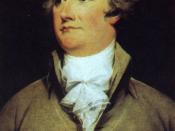The causes of the Whiskey Rebellion can be explained in terms of the immediate events preceding it; however a true understanding also requires an explanation of the political differences which plagued American since its independence. The immediate cause of the Rebellion was the imposition of an excise tax on the production of whiskey. The then Federalist run government implemented the tax to finance the costs of building up American defenses which followed the British seizure of ships in the West Indies. However, the tax proved to be an unfair hardship to those farmers who used whiskey in place of cash for commercial transactions. A revolt of Pennsylvania whiskey distillers in 1794 led to President Washington's sending in troops, the first time federal authority was established by military means within state boundaries.
This use of governmental force to suppress the Rebellion brought to the foreground the longstanding differences between those who believed in a strong central government (Federalists) and those who believed most political power should rest within the states (Anti-Federalists which later became the Republicans).
Whereas the Federalist imposition of the tax had most likely been a sincere act of national security, the opposition interpreted the actions of President Washington to be a transgression of the powers of central government. They were "convinced that it was repression, not revenue that the Federalist had in mind, they construed opposition to the whiskey tax as a republican's duty" (79). President Washington blamed the misrepresentations of the "combinations" (democratic societies) as playing an influential role in encouraging the Whiskey Rebellion and sees his suppression of the Rebellion as a constitutional right.
Some historians have interpreted the conflicts as clashes between agrarian democracy and urban capitalism. Others see it as a conflict over capitalism; the Federalists were commercially oriented, whereas the Republicans...


